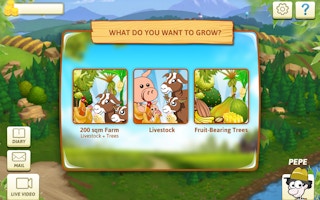Players of the online game FarmVille that gained popularity through the social networking site Facebook can now put their dream farms into reality and get a taste of real-life farming with a new game called FarmOn.ph.
Recently launched by Philippines-based website development company Sproads, FarmOn.ph is a bridge between virtual and real-world farming which allows players online to become entrepreneurial farmers offline.
It is a farm management system, a farm community website, an ecommerce and an online game rolled into one, said the company.
FarmOn.ph founder Teodolo Otoman II said the firm’s objective is not just to entertain, but to help create a new generation of farmers among Filipinos in a country that was once largely agricultural.
He termed it a ‘movement’ that could address food security and revolutionise farming in the Philippines, making Filipinos self-sufficient in terms of agricultural needs in the future.
“Through this group we will create a new farming culture,” Otoman said in his message on the FarmOn.ph website.
“
Its goal is not just to entertain, but to help create a new generation of farmers among Filipinos, especially for a country that was once largely agricultural
Teodolo Otoman II, managing director, FarmOn.ph
Players can design their own farms and decide on what crops to grow based on available options which are mostly locally-grown vegetables and fruit trees. The choices these players make in their game will be reflected in the real-life farm.
To do this, Sproads looked for an agricultural land where FarmOn players or ‘FarmOners’ can implement the farm community they build on their FarmOn game application.
The company then chose a two-hectare land in Santiago City, Isabela, a farming town in northern Luzon in the Philippines, which is more than 320 kilometres north of the country’s capital, Manila. Otoman and his team of farmers will oversee the management of the land and the farm will be expanded as needed, FarmOn said.
The local farmers hired and chosen by Sproads will be the one to execute the approved farm plan and will update the game player through the game console and live video feeds.
Santiago City sits at the heart of Isabela, a province surrounded by valleys and mountains known to be agriculturally rich, particularly for its hybrid rice and corn produce. Some of Isabela’s towns were also being recognised and awarded for becoming an agro-eco city.
Although Isabela is not frequently visited by natural disasters such as typhoons and floods, if any unforseen event strikes and destroys the crops, FarmOn will replace the seeds and replant them with no extra charge to the farm owner, added FarmOn.
The company also emphasised that it will practice organic farming and has partnered with the Department of Agriculture and with Quirino State University, a local university in the province. Farmers on the ground at Santiago City will consistently receive trainings and seminars and experts will closely supervise them and the farm, stated the company.
The players or the entrepreneurs and the farmers are limited by their roles, but FarmOn does not see these things as limitations that will hinder the progress of both our farmers and our entrepreneurs, Otoman told Eco-Business. “We see these gaps as opportunities to further strengthen the relationships of our local farmers to Filipino entrepreneurs,” he stressed.
Players can earn profits through selling the harvested crops or they can pick them up from the farm for their personal use.
Under a profit sharing agreement, the online players get 50 per cent of the profits from the harvest sale, while the real life farmers take 48 per cent and the remaining two per cent goes to the referring agent or the partner.
“The produce will be sold directly to consumers, restaurants or hotels and players or the FarmOners won’t need to employ any middleman or sales person to do that,” Otoman told local television network GMA News.
FarmOn has limited membership of only up to 200 currently and registration is open from now until has opened until July 31, while real farming is set to begin its operations by September this year. However, the company said it is already set to expand farm operations in the provinces of Pangasinan, La Union, Bulacan, Batangas, and Laguna.
The set of fruits and vegetables as well as livestock such as chicken, goat and pig that can be raised in the farm with their corresponding prices and possible return on investment are available on the website.
“More than the profits, what is more important for us is to empower our farmers and our local communities. We don’t want people to invest on FarmOn just for money. We want them to see the big picture, and that is to invest in our country’s natural resources and see Philippine agriculture thrive again for the generations to come,” said Otoman.

















